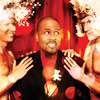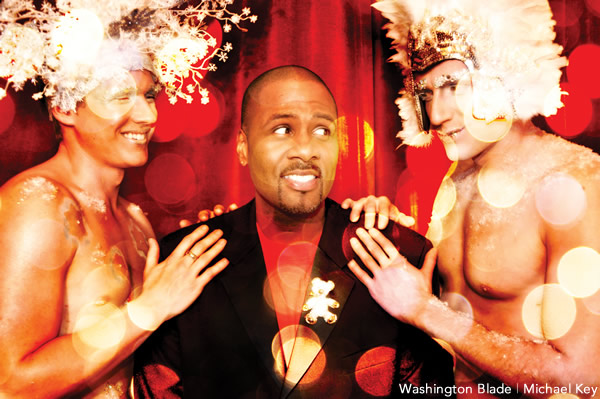Arts & Entertainment
Going ‘Greene’
Broadway star joins Gay Men’s Chorus for annual holiday extravaganza

It’s that time of the year again and the Gay Men’s Chorus is ringing in the holidays and the opening of its 2011-2012 season with its annual holiday concert. This year’s version is being dubbed “Red & Greene” and features special guest Ellen Greene, Broadway’s original Audrey from “Little Shop of Horrors.”
“There’s nothing like a Jew who loves Christmas, by the way,” Greene says. “I’ve been known to have three Christmas trees … one for children in the front, one for the middle room where the piano was and then one in the back.”
Greene will be joined by pianist Christian Klikovits and Grammy Award-winning cellist Stephen Erdody. The three were in town last weekend for a dinner with the Chorus’s board, managing director David Jobin and a couple rehearsals with artistic director Jeff Buhrman and the whole chorus.
“David Jobin is such a spectacular producer,” Greene says. “We’ve been treated so well, everybody’s been lovely to us … this is my Christmas present.”
The show will include the full chorus singing holiday standards, including “Angels We Have Heard on High” and smaller ensembles having fun dancing and singing in full costumes.
“Christmas represents to me, theater, people, artists, and I mean artists acrossthe board … if you think, if you dream, if you create, you’re an artist … so Christmas represented … coming together as a family,” Greene says. “Anything that involves music and coming together feels holy and special and magical.”
Greene plans two dedications during the engagement — “Winter Song” for those who’ve died, and “Universal Child” for same-sex marriage rights and anti-bullying.
“My show is so depressing, that the reason I have to talk in between is I can make everyone laugh so I can sing another song,” she says.
This isn’t Greene’s first time singing with a chorus. Growing up, her whole family sang, earning them the nickname, “the singing Greenes” and she always had a big solo on holidays.
“I was singing with the cantor … and I got a 104 fever because I had tremendous stage fright … I don’t know why I picked this career,” Greene says. “My father … he says, ‘Let her sing.’ As soon as I sang, my temperature went down.”
Greene started her career as a nightclub singer in New York at Reno Sweeney, which is where she got all her shows. Her first starring role was in the Broadway bomb, “Rachael Lily Rosenbloom (And Don’t You Ever Forget It)” in 1973.
“Dead? Hollywood? Dead? My whole life I’ve dreamed I’d finally get there. You mean I finally get there, it’s dead? Take away my dreams, you take away my mind,” she recited from the play that closed before it even opened.
Buhrman says the Chorus members are thrilled to have Greene join them.“We had the opportunity to rehearse with her last weekend and she’s just a wonderfully talented performer,” he says.
Greene and the Chorus will each perform their own selections but will also collaborate on three songs Klikovits arranged specifically for the occasion. About 225 men will be in the Chorus, a record for the group. There will be no second-half skit as in previous years, but there will be several theatrical elements including a pageant of showboys, dancing nuns and more.
Buhrman says Greene was on the Chorus’s “wish list” of celebrity guests. “We contacted her management team and made it happen,” he says.
It’s been a big year of collaboration for the Chorus. For its 30th anniversary concert earlier this year, another Broadway vet joined them — Jennifer Holliday.
Greene was performing in Central Park during the 1977 New York City blackout.
“I was on stage, about to sing my big number … and it went absolutely dark in the park … all of a sudden, I just started to sing … and the pianist started followingme. And I said, ‘If you just do what you always do, walk straight, you will not fall off the platform,” Greene says.
They finished the show with car headlights lighting the stage.
Greene is also active politically, working with various groups including GLSEN (Gay, Lesbian & Straight Education Network) and more.
While working on the show “Pushing Daisies,” Bruce Cohen asked Greene to go to New Hampshire to campaign for Hillary Clinton with the “Lucky Charms.”
“She couldn’t be busier … she actually found my address and wrote me a letter,” Greene says. “I made [Klikovits] open the letter because I was shaking.”
Coming up, Greene is thinking of releasing a holiday album, rereleasing “In Her Eyes,” an album she made with Klikovits, and possibly a never-before-released album.
The Chorus will be giving four performances starting at 8 p.m. on Dec. 16. There will be two performances on Dec. 17 at 3 and 8 p.m. and a final performance on Dec. 18 at 3 p.m. Tickets range from $25 to $50 and can be purchased online at gmcw.org.
“I’m very excited to see all the dancing and singing and silliness … I know they’re going to take care of the fun part,” Greene says. “I’m excited to meet 225 men, I mean, it’s me and all those men, what’s bad about those odds?”
‘RED & GREENE’
Gay Men’s Chorus of Washington With special guest Ellen Greene
Lisner Auditorium 730 21st Street, NW
Dec. 16 at 8 p.m. Dec. 17 at 3 and 8 p.m. Dec. 18 at 3 p.m.
$20-$50 gmcw.orgNew book shares Chorus history
The holiday concert isn’t the only news about the Gay Men’s Chorus. Paula Bresnan Gibson has written a book, “Voices from a Chorus,” all about the group and its history.
The book is told through the perspective of a woman who served on the Chorus’s board of directors. It includes many interviews, including one with the first openly gay Episcopalian bishop Gene Robinson, a longtime supporter of the Chorus and recipient of its highest award.
The interviews show how men have overcome challenges such as dealing with their sexual orientation, their families, friends, living with HIV/AIDS and more just by participating in the Chorus.
Gibson is scheduled to make appearances at American University on Feb. 10, Proud Bookstore in Rehoboth Beach on Feb. 11 and Day of the Book Festival in Kensington on April 22.
The book is available for purchase online at voicesfromachorus.com and in local bookstores, Politics & Prose, Kramerbooks, Trohv Home & Gift and Kensington Row Bookshop.
The Blade wrote an extensive story of the Chorus’s history upon its 30th anniversary in June. It’s here.
Books
Feminist fiction fans will love ‘Bog Queen’
A wonderful tale of druids, warriors, scheming kings, and a scientist

‘Bog Queen’
By Anna North
c.2025, Bloomsbury
$28.99/288 pages
Consider: lost and found.
The first one is miserable – whatever you need or want is gone, maybe for good. The second one can be joyful, a celebration of great relief and a reminder to look in the same spot next time you need that which you first lost. Loss hurts. But as in the new novel, “Bog Queen” by Anna North, discovery isn’t always without pain.

He’d always stuck to the story.
In 1961, or so he claimed, Isabel Navarro argued with her husband, as they had many times. At one point, she stalked out. Done. Gone, but there was always doubt – and now it seemed he’d been lying for decades: when peat cutters discovered the body of a young woman near his home in northwest England, Navarro finally admitted that he’d killed Isabel and dumped her corpse into a bog.
Officials prepared to charge him.
But again, that doubt. The body, as forensic anthropologist Agnes Lundstrom discovered rather quickly, was not that of Isabel. This bog woman had nearly healed wounds and her head showed old skull fractures. Her skin glowed yellow from decaying moss that her body had steeped in. No, the corpse in the bog was not from a half-century ago.
She was roughly 2,000 years old.
But who was the woman from the bog? Knowing more about her would’ve been a nice distraction for Agnes; she’d left America to move to England, left her father and a man she might have loved once, with the hope that her life could be different. She disliked solitude but she felt awkward around people, including the environmental activists, politicians, and others surrounding the discovery of the Iron Age corpse.
Was the woman beloved? Agnes could tell that she’d obviously been well cared-for, and relatively healthy despite the injuries she’d sustained. If there were any artifacts left in the bog, Agnes would have the answers she wanted. If only Isabel’s family, the activists, and authorities could come together and grant her more time.
Fortunately, that’s what you get inside “Bog Queen”: time, spanning from the Iron Age and the story of a young, inexperienced druid who’s hoping to forge ties with a southern kingdom; to 2018, the year in which the modern portion of this book is set.
Yes, you get both.
Yes, you’ll devour them.
Taking parts of a true story, author Anna North spins a wonderful tale of druids, vengeful warriors, scheming kings, and a scientist who’s as much of a genius as she is a nerd. The tale of the two women swings back and forth between chapters and eras, mixed with female strength and twenty-first century concerns. Even better, these perfectly mixed parts are occasionally joined by a third entity that adds a delicious note of darkness, as if whatever happens can be erased in a moment.
Nah, don’t even think about resisting.
If you’re a fan of feminist fiction, science, or novels featuring kings, druids, and Celtic history, don’t wait. “Bog Queen” is your book. Look. You’ll be glad you found it.
Movies
A Shakespearean tragedy comes to life in exquisite ‘Hamnet’
Chloe Zhao’s devastating movie a touchstone for the ages

For every person who adores Shakespeare, there are probably a dozen more who wonder why.
We get it; his plays and poems, composed in a past when the predominant worldview was built around beliefs and ideologies that now feel as antiquated as the blend of poetry and prose in which he wrote them, can easily feel tied to social mores that are in direct opposition to our own, often reflecting the classist, sexist, and racist patriarchal dogma that continues to plague our world today. Why, then, should we still be so enthralled with him?
The answer to that question might be more eloquently expressed by Chloe Zhao’s “Hamnet” – now in wide release and already a winner in this year’s barely begun awards season – than through any explanation we could offer.
Adapted from the novel by Maggie O’Farrell (who co-wrote the screenplay with Zhao), it focuses its narrative on the relationship between Will Shakespeare (Paul Mescal) and his wife Agnes Hathaway (Jessie Buckley), who meet when the future playwright – working to pay off a debt for his abusive father – is still just a tutor helping the children of well-to-do families learn Latin. Enamored from afar at first sight, he woos his way into her life, and, convincing both of their families to approve the match (after she becomes pregnant with their first child), becomes her husband. More children follow – including Hamnet (Jacobi Jupe), a “surprise” twin boy to their second daughter – but, recognizing Will’s passion for writing and his frustration at being unable to follow it, Agnes encourages him to travel to London in order to immerse himself in his ambitions.
As the years go by, Agnes – aided by her mother-in-law (Emily Watson) and guided by the nature-centric pagan wisdom of her own deceased mother – raises the children while her husband, miles away, builds a successful career as the city’s most popular playwright. But when an outbreak of bubonic plague results in the death of 11-year-old Hamnet in Will’s absence, an emotional wedge is driven between them – especially when Agnes receives word that her husband’s latest play, titled “Hamlet,” an interchangeable equivalent to the name of their dead son, is about to debut on the London stage.
There is nothing, save the bare details of circumstance around the Shakespeare family, that can be called factual about the narrative told in “Hamnet.” Records of Shakespeare’s private life are sparse and short on context, largely limited to civic notations of fact – birth, marriage, and death announcements, legal documents, and other general records – that leave plenty of space in which to speculate about the personal nuance such mundane details might imply. What is known is that the Shakespeares lost their son, probably to plague, and that “Hamlet” – a play dominated by expressions of grief and existential musings about life and death – was written over the course of the next five years. Shakespearean scholars have filled in the blanks, and it’s hard to argue with their assumptions about the influence young Hamnet’s tragic death likely had over the creation of his father’s masterwork. What human being would not be haunted by such an event, and how could any artist could avoid channeling its impact into their work, not just for a time but for forever after?
In their screenplay, O’Farrell and Zhao imagine an Agnes Shakespeare (most records refer to her as “Anne” but her father’s will uses the name “Agnes”) who stands apart from the conventions of her town, born of a “wild woman” in the woods and raised in ancient traditions of mysticism and nature magic before being adopted into her well-off family, who presents a worthy match and an intellectual equal for the brilliantly passionate creator responsible for some of Western Civilization’s most enduring tales. They imagine a courtship that would have defied the customs of the time and a relationship that feels almost modern, grounded in a love and mutual respect that’s a far cry from most popular notions of what a 16th-century marriage might look like. More than that, they imagine that the devastating loss of a child – even in a time when the mortality rate for children was high – might create a rift between two parents who can only process their grief alone. And despite the fact that almost none of what O’Farrell and Zhao present to us can be seen, at best, as anything other than informed speculation, it all feels devastatingly true.
That’s the quality that “Hamnet” shares with the ever-popular Will Shakespeare; though it takes us into a past that feels as alien to us as if it took place upon a different planet, it evokes a connection to the simple experience of being human, which cuts through the differences in context. Just as the kings, heroes, and fools of Shakespeare’s plays express and embody the same emotional experiences that shape our own mundane modern lives, the film’s portrayal of these two real-life people torn apart by personal tragedy speaks directly to our own shared sense of loss – and it does so with an eloquence that, like Shakespeare’s, emerges from the story to make it feel as palpable as if their grief was our own.
Yes, the writing and direction – each bringing a powerfully feminine “voice” to the story – are key to the emotional impact of “Hamnet,” but it’s the performances of its stars that carry it to us. Mescal, once more proving himself a master at embodying the kind of vulnerable masculine tenderness that’s capable of melting our hearts, gives us an accessible Shakespeare, driven perhaps by a spark of genius yet deeply grounded in the tangible humanity that underscores the “everyman” sensibility that informs the man’s plays. But it’s Buckley’s movie, by a wide margin, and her bold, fierce, and deeply affecting performance gives voice to a powerful grief, a cry against the injustice and cruelty of what we fumblingly call “fate” that resonates deep within us and carries our own grief, over losses we’ve had and losses we know are yet to come, along with her on the journey to catharsis.
That’s the word – “catharsis” – that defines why Shakespeare (and by extension, “Hamnet”) still holds such power over the imagination of our human race all these centuries later. The circumstantial details of his stories, wrapped up in ancient ideologies that still haunt our cultural imagination, fall away in the face of the raw expression of humanity to which his characters give voice. When Hamlet asks “to be or not to be?,” he is not an old-world Danish Prince contemplating revenge against a traitor who murdered his father; he is Shakespeare himself, pondering the essential mystery of life and death, and he is us, too.
Likewise, the Agnes Shakespeare of “Hamnet” (masterfully enacted by Buckley) embodies all our own sorrows – past and future, real and imagined – and connects them to the well of human emotion from which we all must drink; it’s more powerful than we expect, and more cleansing than we imagine, and it makes Zhao’s exquisitely devastating movie into a touchstone for the ages.
We can’t presume to speak for Shakespeare, but we are pretty sure he would be pleased.

Friday, January 9
Women in Their Twenties and Thirties will be at 8 p.m. on Zoom. This is a social discussion group for queer women in the Washington, D.C. area. For more details, visit Facebook.
“Backbone Comedy” will be at 8 p.m. at As You Are. Backbone Comedy is a queer-run fundraiser comedy show at As You Are Bar DC, where comics stand up for a cause. Each show, a percentage of proceeds go to a local organization – Free Minds DC, a reentry organization for individuals impacted by incarceration. Tickets cost $19.98 and are available on Eventbrite.
Saturday, January 10
Go Gay DC will host “LGBTQ+ Community Brunch” at 11 a.m. at Freddie’s Beach Bar & Restaurant. This fun weekly event brings the DMV area LGBTQ+ community, including allies, together for delicious food and conversation. Attendance is free and more details are available on Eventbrite.
Monday, January 12
“Center Aging: Monday Coffee Klatch” will be at 10 a.m. on Zoom. This is a social hour for older LGBTQ+ adults. Guests are encouraged to bring a beverage of choice. For more information, contact Adam ([email protected]).
Genderqueer DC will be at 7 p.m. on Zoom. This is a support group for people who identify outside of the gender binary, whether you’re bigender, agender, genderfluid, or just know that you’re not 100% cis. For more details, visit genderqueerdc.org or Facebook.
Tuesday, January 13
Coming Out Discussion Group will be at 7 p.m. on Zoom. This is a safe space to share experiences about coming out and discuss topics as it relates to doing so — by sharing struggles and victories the group allows those newly coming out and who have been out for a while to learn from others. For more details, visit the group’s Facebook.
Trans Discussion Group will be at 7 p.m. on Zoom. This group is intended to provide an emotionally and physically safe space for trans people and those who may be questioning their gender identity/expression to join together in community and learn from one another. For more details, email [email protected].
Wednesday, January 14
Job Club will be at 6 p.m. on Zoom upon request. This is a weekly job support program to help job entrants and seekers, including the long-term unemployed, improve self-confidence, motivation, resilience and productivity for effective job searches and networking — allowing participants to move away from being merely “applicants” toward being “candidates.” For more information, email [email protected] or visit thedccenter.org/careers.
The DC Center for the LGBT Community will partner with House of Ruth to host “Art & Conversation” at 3 p.m. at 1827 Wiltberger St., N.W. This free workshop will involve two hours of art making, conversation, and community. Guests will explore elements of healthy relationships with a community-centered art activity. This workshop involves paint, so please dress accordingly. All materials will be provided. For more details, email [email protected].
Thursday, January 15
The DC Center’s Fresh Produce Program will be held all day at the DC Center for the LGBT Community. People will be informed on Wednesday at 5 p.m. if they are picked to receive a produce box. No proof of residency or income is required. For more information, email [email protected] or call 202-682-2245.
Virtual Yoga Class will be at 7 p.m. on Zoom. This free weekly class is a combination of yoga, breathwork and meditation that allows LGBTQ+ community members to continue their healing journey with somatic and mindfulness practices. For more details, visit the DC Center’s website.



















